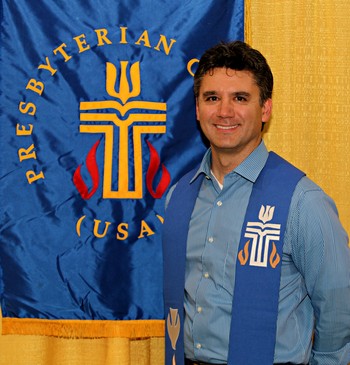When the Rev. Tom Trinidad was summoned out of his committee session at the recent Presbyterian Church (U.S.A.) General Assembly to meet with Assembly Moderator Neal Presa, he expected the worst.
“My first thought was that something had happened to Neal’s boys” (Trinidad and Presa have been friends for about 10 years) “and that he needed my help with them,” Trinidad recalls. “Then, because I tend to imagine the worst, I thought maybe something had happened to my family that Neal had to tell me.”
The purpose of Presa’s summons on the morning of July 3 was to ask Trinidad to serve as vice-moderator of the 220th General Assembly. Presa had been told by Tara Spuhler McCabe, his original running mate who had been installed amid controversy on July 1, that she was resigning the following day, and he wanted Trinidad to succeed her.
“I was relieved,” Trinidad, 42, says, “because both of our families were all right.”
But relieved after being named vice-moderator of a deeply divided denomination? Really? Trinidad had never even attended a General Assembly.
Trinidad was elected a commissioner by Pueblo Presbytery pretty much at the last minute. “We select commissioners on a rotation basis and it was our (Faith Presbyterian Church in Colorado Springs, Colo.) turn to send a ruling elder to GA, but not a minister,” he says. “But we’ve had a number of churches leave the denomination and late this spring my name came to the top.”
Trinidad says one of the exciting aspects of his unexpected ascent to GA commissioner status was the opportunity “to vote for my good friend Neal Presa for moderator.” One of his friends even told him, “What a great vice-moderator you would have been if Neal had known you would wind up a commissioner.”
Trinidad calls it “providence” that he was available when Presa needed a replacement for McCabe ― who came under fire for signing a same-gender marriage license this spring in Washington, D.C. He asked the moderator for a couple of hours to talk over his decision with his family and congregational leaders.
“My wife, Kendra, was wonderful,” Trinidad recounts. “Earlier, she had wondered why I was willing to give up eight days just to support Neal. When she reminded me that was why I was so eager to go in the first place, it was clear that I should say yes to his invitation.”
Key elders and staff members at 213-member Faith Church were also supportive and so Trinidad’s unlikely adventure as vice-moderator began.
First was a crash course in moderating the Assembly from the Rev. Tom Hay, director of operations for the Office of the General Assembly. “Tom took me up on the podium and showed me the monitors and assured me [GA stated clerk] Gradye Parsons would be right there,” Trinidad says. “I watched the training video all the moderator and vice-moderator candidates watch. I figured that I had watched and learned enough about moderating meetings that I could do it.”
Trinidad ― who came to Christianity through Young Life and to the PC(USA) through working on the staff at First Presbyterian Church of Colorado Springs after college ― concedes that he’s “a harsh critic of parliamentary procedure and Robert’s Rules of Order because they foster combativeness and competition. I’m not a real fan but it’s what we use so I’ve tried to learn how to use and not abuse it.”
Pueblo Presbytery has been good training ground -- for both positive and painful reasons. Colorado Springs First ― by far the largest church in the presbytery ― recently left the PC(USA) to be a charter member of the Evangelical Covenant Order of Presbyterians (ECO). “I was encouraged by their previous pastor to attend Princeton Theological Seminary where I came to love Reformed theology and the Presbyterian Church,” Trinidad says.
“When I came back to Colorado Springs five years ago, I had changed my approach to some things that I knew were anathema to First Church and I could see the handwriting [that church’s departure from the PC(USA)] on the wall and it was very painful.
“On the other hand,” Trinidad continues, “now us also-rans in Pueblo Presbytery, because First Church had all the votes, are the runners. We have many more opportunities for discussion, action and development of new leadership. It’s an exciting opportunity for us to grow and develop as a presbytery.”
But the departure of First Church is still painful, Trinidad says. “We want to maintain a relationship with them whether they want that or not. They’re part of us, we’re just not together right now.”
By all accounts Trinidad proved to be a skillful moderator during the Assembly. “There’s no really big headlines ― we probably won’t be known for what we did but for what we didn’t do,” he admits, “but I hope we’re known for recognizing that big change is coming but it must be pastorally managed.”
He rejects comments that the 220th General Assembly “just kicked the can down the road” on such issues as Middle East peace and same-gender marriage. “That’s political language that I just don’t think is appropriate,” he says. “We very carefully picked up the can and carried it down the road so we can take a better look inside in two years.
“We have really good opportunities ahead of us now.”

